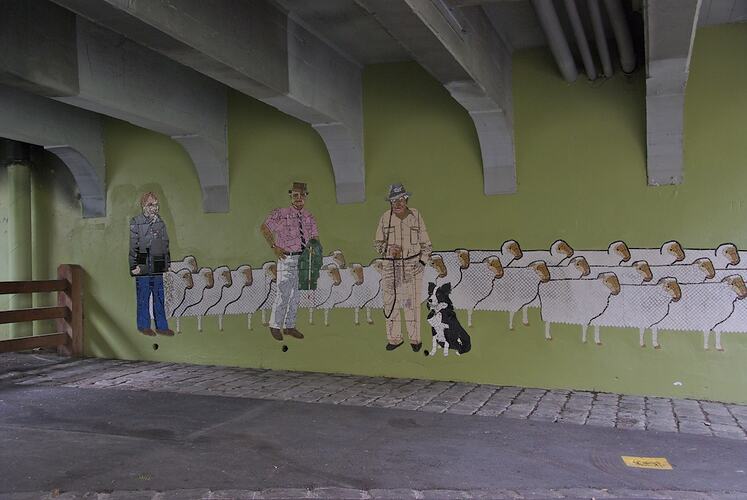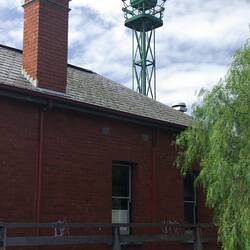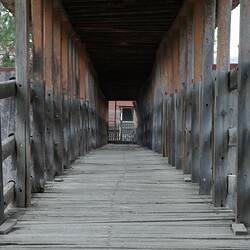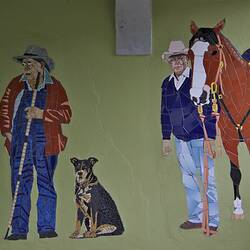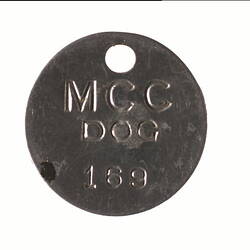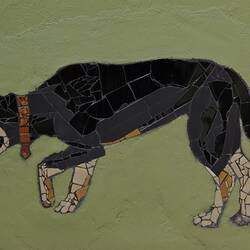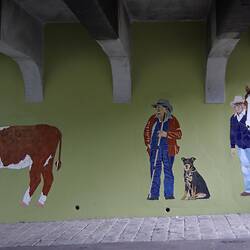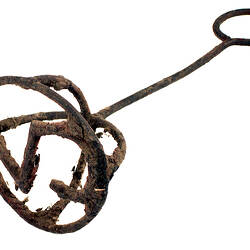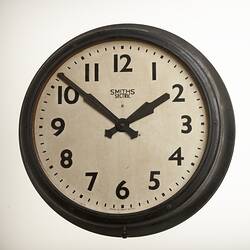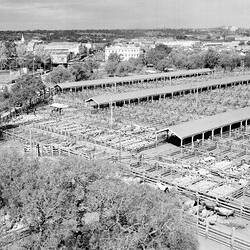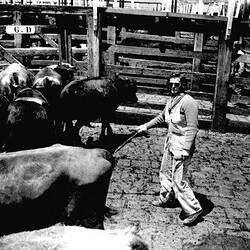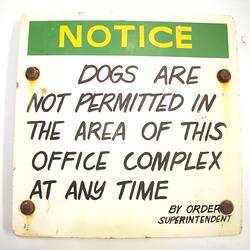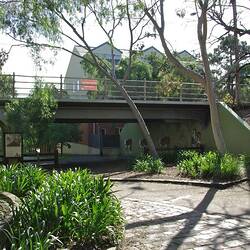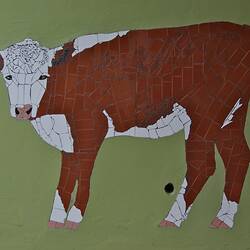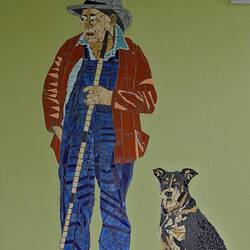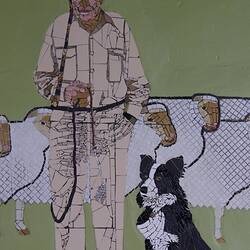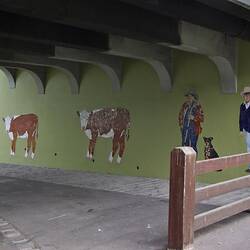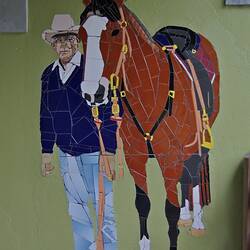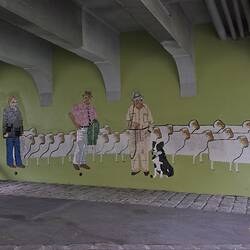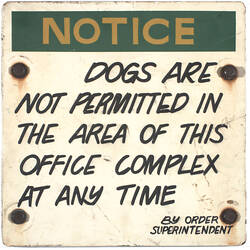The poem "Newmarket Memories" was written by Teddy Cooper who, following his discharge from active service in 1945, worked for many years as an Auctioneer at the Newmarket, Dandenong and other Municipal livestock markets throughout Victoria and the Riverina Districts of New South Wales.
An author's note accompanying the poem explains: "The poem is dedicated to the memory of all those past and present irrespective of their station in life, who have worked within the perimeters of the Newmarket Saleyards and all other Livestock Markets throughout the length and breadth of our Nation in a competitive but co-operative manner, thereby forging a spirit of mateship that endures. It is a tribute also to the many fine pastoralists, Graziers, Butchers, Drovers, Carriers and all others who loyally supported Newmarket and other Livestock Selling Centres in an endeavour to enhance and improve the standards and financial well-being of the Rural Population of our Great Nation."
Dated 3 January 1994, "Newmarket Memories" gives accounts of local identities and details daily routines through casual, day to day language. Written in a classic, lyrical, bush-ballad style, "Newmarket Memories" follows the long tradition of relating anecdotes and tales associated with the itinerant and rebellious spirit of drovers and stockmen. Throughout Australia's literary history, the Bush Ballad has contributed to the poetic construction of a national identity. It portrays a unique cast of heroes with assumed common destinies and interests.
In both literary form and through the process of re-telling, the Bush Ballad or Bush Poem is deeply embedded within Australian culture. It derives its power from the network of cultural contexts that it references and has a way of communicating the commonplace and ordinariness of life and language. The Bush Ballad can be seen as a discourse of a community through the simple communication of feelings and ideas; the context provided by aspects of Australian pioneering mythology and folklore.
Shaped by the conditions of working class life, the poetry within the Newmarket Collection must be viewed in the context of its creation. It is neither an experience of literary grandeur nor eminence, and was never written to fulfil such criteria. Written as a form of entertainment, primarily to be recited aloud, these poems filled cultural spaces now taken up by television or radio. Poetry such as this was shared with mates, sitting in the pub after a long hard day or in the cold frosty mornings when work started long before daylight, the oral tradition of sharing poetry and stories formed an intricate part of the social dynamic.
Defined by a strong sense of collectivity, the poetry aims to portray common experiences and a sense of community and environment. The Newmarket Poetry reflects the culture, values and language of life at the Saleyards. It is the ordinary and everyday aspect of life and language that the poetry represents.
Newmarket Memories
Teddy Cooper, 10 January 1994
The years are quickly fading as the twilight zone nears night
But the memories of the past return with a clarity of sight,
Of great stock trains still standing at Newmarket over night,
Laden full with sheep or cattle to be drafted ere comes light.
The Drovers waiting patiently, their dogs alert and bright,
Waiting for the Shunters to place the trucks on sight,
And when in turn the runs begin, along the old stock route,
Quickly do the big pens fill with stock from North and South.
There was Darcy, Les and Barney, Joe, Stan and many more,
Some showing signs of too much grog from boozing nights before.
But when the trucks were empty and dawn began to break,
A mighty cavalcade of stock had passed the Market gate.
At break of day the Agents came to view their clients' stock,
And quickly had the sale pens fill from country mob and flock.
At eight am the big bell rang, to warn folk far and near,
The greatest livestock sale on earth was grinding into gear.
The Auctioneer read out the terms in voice both loud and clear
Then called for bids to start the sale, from buyers standing near.
He asked for starts, some low some high, from men both shrewd and smart,
And then commenced to battle, from eight til nigh on dark.
Auctioneers of that old brigade, they're a breed that's fading fast,
They stood alone, on the old blue stone, with a client's fate to cast.
A Drover and Clerk his only help as he toiled and called the bid,
And he battled the odds for his old bush mate, so he might make a quid.
Jim Matthews with his gravelled voice, a style alone his own,
Battled hard for country folk from Colac through to Scone.
His rants and raves were quite well known, to we who knew him well,
But pity help the city slick when Jim commenced to sell.
Dal Bateman standing on the fence, he was an awesome sight,
But the bullocks he was offering were a butcher's sheer delight.
They hailed ex upper Murray, fed on pastures lush and green,
And made most other cattle look light in the extreme.
There was Balmer from the AML, Fred Nathan on his phone,
Whilst Cornish and G. D'Arcy had Dalgety buy the loan.
Big Billy Mac and Whitfield, when all was going grand,
Kept McNamara's name in lights, when stock were in demand.
Jack Coghlan in his own quiet way, made sales throughout the land,
A most respected stockman, with an ever helping hand.
To the Weidners and the Bullocks and the Punters way out back,
Jack Coghlan's word to them by phone put thousands on the track.
Gillispie from Young-Husbands, he was quick at repartee,
He kept the buyers honest and made them pay the fee.
And Cochrane from the G & N was super on his day,
And fiercely raged the battle when Campbell joined the fray.
There was Mehegan, Quirk and Rodwell, booming voices born to sell,
Clear and crisp as crystal, could sell coal to men in hell.
O'Connell and Mick Hornsby selling calves way down the back,
Kept the market keen and vital for your stockmen on the track.
Ronalds hailed from Borthwicks, he could make a market dear,
And pity help the little bloke if Gilbys hit top gear.
Greenhams bought a pen to two but Smorgans played it tough,
And bought in greater numbers when graziers found it rough.
At end of day Clerks ran the fray, the boss had started drinking,
Whilst Kennedy from Stock and Land took notes and quotes for printing.
The drovers' dogs were kennelled down, as sun sank to the West,
And the peppercorns cast shadows, as our day's work came to rest.
Bleats and bellows now are silenced, as the city spreads its wings,
And names that I have mentioned, are but few of whom we sing.
The Graziers from out the back, McRaes, the Bourkes and Starr,
Represent our country's stockmen, scattered wide and far.
The Pastoral Pub has had it, Oh what stories it could tell
To the up and coming offspring of a kin that battled hell.
From Gippsland to the Western Plains, the tales of woe and fame,
Shaped the history of our nation, forged by men from whence they came.
The drover's dog and ponies, they too have gone to rest.
They've passed to greener pastures kept only for the best.
The kelpies and the collies, the stockhorse hard and lean,
No more shall cross the cobbles nor ever more be seen.
The rails have gone, the cobbles sold but memories will remain,
Of those grand and gentle Stockmen, whose ghosts still roam the lane.
Their voices stilled and silenced by the passing of the time,
Oh how much do we owe them, their efforts were sublime.
There's not too many of us left, who witnessed the demise
Of the greatest selling centre, south of the Great Divide.
Our market's passed to history but our old clock will remain,
In honour to the memory of our men of Marketing fame.
Many now have passed that pale, beyond the Great Divide,
To pastures green and a lifetime dream, with old mates by their side.
As the years roll by, may you recall, as the leaves from the great oaks fall,
That within the shadows of our clock tower, was the Greatest Stock Market of all.
'GONE BUT NOT FORGOTTEN, IT SERVED OUR NATION WELL'
More Information
-
Keywords
Cultures and histories : Melbourne and Victoria, agricultural industry, country life, city & town life, Working Lives
-
Authors
-
Article types
